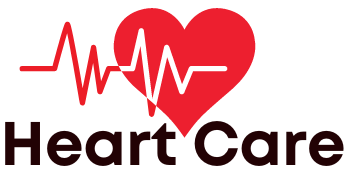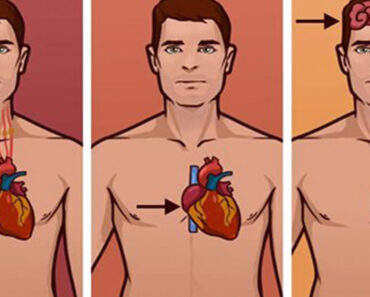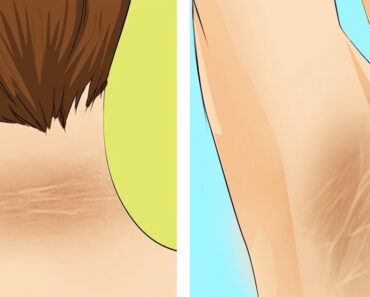Before COVID-19, heart disease was the most common reason for deaths in America, and it is expected to likely be next on the list of dreadful causes. What can you do to prevent it? How can you avoid it? Mayo Clinic, the non-profit medical center that is focused on integrated health care, education, and research – says, “Heart failure may be continuous (chronic), or the condition could develop abruptly (acute). Heart failure symptoms and signs could be” these. Learn more about them and ensure your own health and that of those around you, be sure to take note of these warning signs that you’ve Been a Victim of Coronavirus.
10. You May Have Shortness of Breath

©SHUTTERSTOC
The condition is known as dyspnea. Shortness of breath can happen “when you work hard or lay on your back,” says the Mayo Clinic. “Few feelings are as terrifying as being unable to take in enough air. It’s usually described as an extreme tightening of the chest, a feeling of hunger for air or breathing problems and breathlessness, or a feeling of being suffocated. If you experience unresolved breath shortness, particularly when it occurs suddenly and is extremely severe, consult your physician as soon as possible.”
9. You May Feel Fatigued and Weakness

©SHUTTERSTOC
8. You May Have Swelling

©SHUTTERSTOC
Also known as edema, swelling of the ankles, legs, and feet could be an indication of a heart problem. “Edema is swelling that results from excessive fluid that has accumulated in the tissues of your body,” says the Mayo Clinic. “Although the condition may affect any part of your body it is possible to be more aware of it on your arms, hands feet, ankles, and legs. Edema may be caused by medications, pregnancy, or an underlying illness usually kidney disease, or cirrhosis of the liver.”
7. You May Have a Rapid or Irregular Heartbeat

©SHUTTERSTOC
“Heart rhythm issues (heart arrhythmias) are caused because the electric impulses which coordinate your heartbeats do not function correctly which causes your heartbeat to be too fast, too slow, or in irregular patterns,” states Mayo Clinic. Mayo Clinic. “Heart arrhythmias (uh-RITH-me-uhs) can appear as a fluttering or racing heart and are often benign. However, certain heart arrhythmias can cause uncomfortable and sometimes life-threatening symptoms.”
6. You May Have a Persistent Cough or Wheezing

©SHUTTERSTOC
An ongoing cough or wheezing can be associated with “white or pink blood-colored phlegm,” According to Mayo Clinic. Mayo Clinic.
5. You May Feel an Increased Need to Urinate at Night

©SHUTTERSTOC
“Up fifty percent to a quarter of people suffering from heart failure experience urine incontinence (UI) and an overactive bladder (OAB),” says one study. It adds to the Cleveland Clinic: “Frequent urination is also an indicator of other serious issues, such as prostate infection, bladder infections or heart conditions and leg swelling. It could also be a sign of interstitial cystitis (also known as the painful bladder syndrome) that is a chronic inflammation bladder disorder.”
4. You May Have a Swelling in Your Abdomen

©SHUTTERSTOC
“Ascites is an illness in which fluid builds up in the spaces in the abdomen. If it is severe, ascites can be uncomfortable,” reports Johns Hopkins. “The problem could hinder you from moving freely. Ascites may cause an abdominal infection. The fluid can also enter the chest area and cover your lungs. This can make it difficult to breathe.”
3. You could experience very rapid Weight Gain due to Fluid Retention.
“Weight changes are the first indication of a problem with fluid balance. A majority of people have up to 15 pounds of fluid before noticing the belly and leg swelling. However, signs like shortness of breath, coughing as well as nausea, loose stools, and feeling fuller when not eating a lot can develop around 5 to 7 pounds” Doctor. Eldrin Lewis is a specialist in heart failure at Harvard’s affiliated Brigham and Women’s Hospital, says Harvard Health. Contact a physician. “Don’t delay until you feel sick and you could have gained five to 10 pounds more by that point and could be on your way to having a serious health issue.”
2. You May Have a Lack of Appetite and Nausea
“Loss of appetite has become a frequent issue in patients suffering from heart disease that can result in undernutrition,” according to one study. “Health medical professionals should regularly evaluate appetite and speak with patients about’ feelings about appetite, intake of nutrition and body weight, and provide proper nutritional guidance according to their requirements.”
When to See a Doctor
According to the Mayo Clinic says: “See your physician if you may be having symptoms or signs that suggest heart disease. Get emergency medical attention if you experience any of the following symptoms:
- Chest pain
- Acute weakness or a severe tingling
- Heartbeats that are irregular or rapid, often caused by chest pain or fainting
- A sudden, intense breathlessness and vomiting up pink and foamy mucus.”



